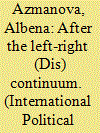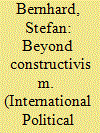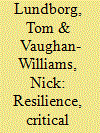|
|
|
Sort Order |
|
|
|
Items / Page
|
|
|
|
|
|
|
| Srl | Item |
| 1 |
ID:
109463


|
|
|
|
|
| Publication |
2011.
|
| Summary/Abstract |
This article examines the status of globalization as a causal factor in political mobilization and proposes a research agenda for diagnosing the impact of global socio-economic dynamics on ideological orientation in national polities. Focusing on Europe's established democracies, the article outlines recent shifts in Europe's ideological landscape and explores the mechanisms generating a new pattern of political conflict and electoral competition. It advances the hypothesis that the knowledge economy of open borders has brought about a political cleavage intimately linked to citizens' perceptions of the social impact of global economic integration. In this context, the polarization of life chances is determined by institutionally mediated exposure to both the economic opportunities and the hazards of globalization. Fostered by the increasing relevance of the international for state-bound publics, new fault-lines of social conflict are emerging, giving shape to a new, "opportunity-risk," axis of political competition. As the novel political cleavage challenges the conventional left-right divide, it is likely to radically alter Europe's ideological geography.
|
|
|
|
|
|
|
|
|
|
|
|
|
|
|
|
| 2 |
ID:
109466


|
|
|
|
|
| Publication |
2011.
|
| Summary/Abstract |
This article applies a political sociology of knowledge to an EU social policy field. Taking the case of poverty and social inclusion policy, it shows that European social policy has found a raison d'être alongside national social policies, feeding into EU member states' national policies and producing comparative policy-relevant knowledge based on a genuine set of resources. Going beyond constructivist approaches, this article contends that the establishment of these resources can be reconstructed productively as the establishment of a transnational field in Pierre Bourdieu's sense of the term. In a process stretching over more than four decades, the EU's rudimentary policy for tackling poverty in the 1970s has evolved into a semi-autonomous field of social inclusion policy. This field encompasses monitoring capital, social capital, officializing capital, scientific capital, and informational capital, all of which EU-level actors use in different ways to position themselves against other actors in this transnational field. Thus, a complex and dynamic configuration arises that consists of actors, institutions, and ideas. The article concludes that while there are many affinities between constructivism and political sociology, the latter can go further in analyzing and theorizing phenomena such as ideas and discourses.
|
|
|
|
|
|
|
|
|
|
|
|
|
|
|
|
| 3 |
ID:
109461


|
|
|
|
|
| Publication |
2011.
|
| Summary/Abstract |
The European Instrument for Democracy and Human Rights (EIDHR) is often considered the "jewel in the crown" of the European Union's democracy promotion. Its mandate encompasses the funding of democratizing civil society organizations and thus the facilitation of democratization "from below." It is argued here that if we apply Foucauldian governmentality tools to the analysis of the workings of the EIDHR, we can see that, despite the pluralistic rhetoric that guides it, the Instrument's objectives and management structures facilitate particular kinds of democratic visions. Neoliberal governmentality, it is argued, may be hidden deep within the expectations set for EU-funded civil society "democratizers." This has important consequences for how we understand the model of democracy that the European Union promotes and the power relations of the European Union's "locally owned" democracy promotion.
|
|
|
|
|
|
|
|
|
|
|
|
|
|
|
|
| 4 |
ID:
109464


|
|
|
|
|
| Publication |
2011.
|
| Summary/Abstract |
The increasing privatization of security and the changing patterns of security governance call into question the foundational lines of demarcation between the "public" and "private." This article investigates how key actors in the security assemblage at Stockholm-Arlanda Airport make sense of their roles in relation to public-private distinctions. While central to the ways in which security actors understand themselves and each other, closer inspection reveals that the drawing of these lines is also highly ambivalent and contested-in relation to questions of control and regulation, authority, as well as security rationalities. Further, "private-private" and "public-public" contestations also are informed by the obdurate public-private distinction.
|
|
|
|
|
|
|
|
|
|
|
|
|
|
|
|
| 5 |
ID:
109462


|
|
|
|
|
| Publication |
2011.
|
| Summary/Abstract |
This article investigates the political significance of the orientation of Western security relations around critical infrastructure (CI) and resilience planning. While the analysis is located in the International Political Sociology literature, it departs from recent biopolitical accounts of CIs and resilience. These accounts tend to present such apparatuses as closed, totalizing, and inevitably "successful" modes of governance. Rather, we argue that resilient CIs are open, vulnerable, and often absurd systems that continually falter, backfire, and often undermine themselves according to their own logic. By developing what we call a "molecular security" approach, we draw attention to the way in which life constantly evades capture. In this sense, we suggest, there is always an excess of "life" in biopolitics.
|
|
|
|
|
|
|
|
|
|
|
|
|
|
|
|
|
|
|
|
|